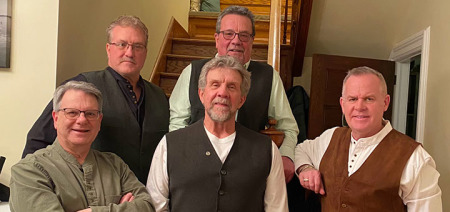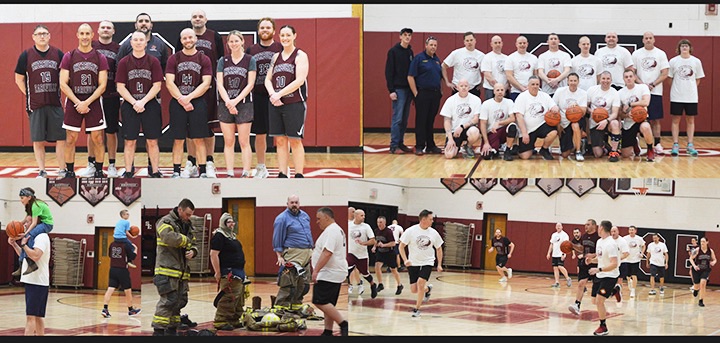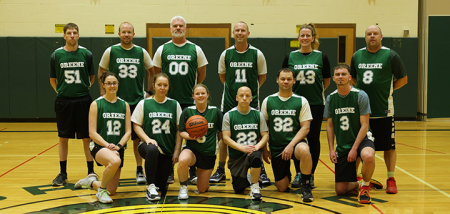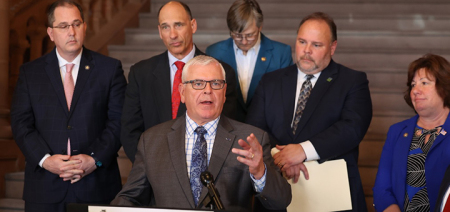NHS Sports Hall Of Fame Induction: Frank R. Wassung, Coach/Superintendent 1915-37
Published:
July 21st, 2017

Tom Rowe
Contributor
Submitted Photo
NORWICH – Much like the well-known polymaths of history – Leonardo da Vinci, Benjamin Franklin, Galileo (Galilei) and Thomas Jefferson to name just a few – Frank Rockwood Wassung was a “Renaissance Man” in the utmost sense.
Polymath, of Greek origins, is a person of wide-ranging knowledge or learning, but since the Middle Ages the term “Renaissance Man” has come into wider use to signify a person whose expertise spans a significant number of different subject areas, referring to the renaissance time period when this ideal burgeoned. To be considered a “Renaissance Man” an individual must be accomplished in all four categories of expertise – knowledge, physical development, social accomplishments and the arts. Wassung was not only accomplished, but flourished in all of these endeavors.
A graduate of Hamilton College with two degrees, he was a teacher, principal and superintendent; coached basketball and was directly responsible for improving the world of athletics in New York State; earned a law degree and became a global diplomat in developing educational programs following World War II; and learned to play the piano by ear, eventually writing the lyrics and music that students at Norwich High School still sing today.
Anyone of those achievements could have won him accolades, but the sheer brilliance with which he accomplished all four has won him a place of honor as part of the seventh induction class to the Norwich High School Sports Hall of Fame.
Knowledge:
Born in Johnstown on Sept. 1, 1891, Wassung matriculated at Hamilton College in Clinton where he graduated with a Bachelor of Philosophy degree (Ph. B.) on June 23, 1913. A member of Psi Upsilon, the ninth oldest social fraternity, Wassung was enrolled in the Latin-Scientific Course which required he study Mathematics (algebra and trigonometry), Latin (Cicero, Horace and Livy), Public Speaking (declamation, writing and oratory), English (composition and rhetoric), Language (French and German), Bible, and Gymnasium and Hygiene. He later earned his Master’s degree from Hamilton, as well.
He began his 39-year career in education in 1914 at Albion High School in western New York where he was Principal and teacher of mathematics. A year later he assumed the same duties at Norwich, where he became affectionately known as Professor. When Stanford J. Gibson stepped down as Superintendent after 20 years (1899-1919), Wassung took the reins and ably steered the Norwich ship until his departure following the 1936-37 school year (18 years). His final stop on his academic train took him to Garden City on Long Island, where he was Superintendent for another 16 years until his retirement in 1952.
Twice during that pivotal school year of 1937-38, Wassung was honored by his students, first when he left Norwich and later when he arrived in Garden City.
The Norwich Class of 1937 wrote in “The Archive”:
To Our Superintendent Mr. Frank R. Wassung:
We, the class of 1937, gratefully dedicate this book. Mr. Wassung has expertly served the Norwich schools for twenty-two years and has been a prominent figure in educational projects throughout the state. It has been our privilege throughout our school days to benefit by his capable leadership and wide experience. We have found in him an understanding friend, encouraging us to greater effort and inspiring us to higher ideals.
Likewise, the graduating Garden City students wrote in their 1938 yearbook “The Mast”:
It is quite fitting that Mr. Frank R. Wassung arrived as the new superintendent of schools just as Garden City was advancing at a fast pace. In spite of the fact that a great deal has been accomplished in the past, his energy and enthusiasm will surely carry the school to greater heights. He needs no formal introduction to the students of the school. They all know him, and he knows most of them. His impressive record at Norwich and elsewhere is not what has endeared him to the student body but rather it is his friendliness and sincerity.
Fittingly, the new Garden City Superintendent addressed the student body with a mantra that any school could embody today.
“It is a pleasure for me to be associated with the boys and girls of Garden City in the growth and development of our high school. There are three things for which I hope our school will become noted. First, that each student enrolled give to his tasks the maximum effort and ability which he possesses. Outstanding ability in any field is frequently a natural gift, but outstanding effort is an acquired gift which comes only from patient application and devotion. Secondly, that we build up in our school that spirit which gladly sacrifices individual accomplishment and acclaim for the welfare of a group. This is really the school spirit which produces successful teams, clubs and classes because it realizes that the game is more important than the points scored by the individual and that the result for the group is more important than the applause for the individual. Lastly, that our school build a reputation for sportsmanship and fair play which will endure. Fair play is really only a matter of good manners. It implies generous applause for opponents and courteous treatment of officials. Good public manners contribute to a reputation for good sportsmanship.”
Physical Development:
When Wassung arrived on the Norwich scene in 1915, athletics were in constant disarray to say the least. There had been no basketball team for two seasons and prior to that contests numbered very few because of splinter teams associated with the YMCA, church groups and even competition between competing high school clubs. And, football wasn’t much better as the Purple played only seven games during the three-year span of 1913-15.
His first year of coaching on the hardwoods resulted in a 4-6 record, but just four short years later Norwich (13-1-1) raised the banner with its first New York State championship when the Purple toppled Ilion 18-15 at Syracuse University, with fellow inductee Harold “Clone” Ryan accounting for 14 of the Purple’s 18 points. Wassung, who ended his 4 ½-year coaching career with a 38-24 record, was ably assisted that season by Johnny Barsha. Barsha, an All-American while playing for SU, took over midway through the season when Wassung began prepping to assume his duties as the school’s new Superintendent. Barsha coached one more year, and then Lew Andreas (1921-24) and Reaves “Ribs” Baysinger (1924-27) followed before heading north to Syracuse, where both enjoyed illustrious careers.
Andreas and Baysinger were both hired in the early days of Wassung’s 18-year tenure and later at the start of the 1930s, Kurt Beyer, Frank Giltner and Charlie Miers all came on board for long careers, thanks to Wassung’s keen eye for coaching ability.
Social Accomplishments:
Although he was deft at choosing coaches, Wassung achieved his longest-lasting contribution to athletics when he helped form the present-day New York State Public High School Athletic Association (NYSPHSAA). In 1921, he met with Daniel Chase, Supervisor of Physical Education in the State Education Department, to plan a statewide organization that would bring consistency to eligibility rules and to conduct state tournaments. The aforementioned NYSPHSAA was formally conceived two years later in 1923. Before that, interscholastic sports were operated by outsiders, but problems developed. Local community pride engendered excesses, colleges and commercial agencies became involved and practices inconsistent with the objectives of education were common.
While he was instrumental in helping formulate the NYSPHSAA in 1923, nine years later he was again at the forefront when the Pupil Benefits Plan Student Accident Insurance (PBP) took shape. PBP was the creation of Wassung and Robert Wegner of Roslyn. Their idea took shape as a result of a lacerated finger and a patient-doctor discussion during the course of treatment. The physician, Dr. Ralph S. Emerson, with the help of his associate, Dr. Fredric E. Elliot, a founder of Blue Cross Blue Shield, set into motion the creation of the New York State High School Athletic Protection Plan.
PBP’s high quality coverage extends to both public and private schools, pre-K through 12th grade; and includes all school-sponsored activities, athletics programs, work study, noon hour programs, field trips and even altercations between students. The first athletes were covered in the fall of 1932 for 40 cents per student. Sixty schools bought coverage for 1,255 students, while today over 700,000 students in 400 school districts are protected.
Both the NYSPHSAA and PBP came to fruition while Wassung was manning the reins at Norwich, but while he was nearing the end of his tenure at Garden City a venture of much more international favor came his way. As one of 12 school superintendents throughout the United States, Wassung was chosen by General Douglas A. MacArthur to travel to occupied Japan to help with the post-war revival of that country’s educational system. Wassung’s hometown newspaper The Morning Herald of Gloversville and Johnstown reported on that trip in its Tuesday, Nov. 8, 1949 edition with the following headline and story.
Japan’s Education Program Assisted By Frank Wassung
A former Johnstown resident is assisting in the development of a program of educational leadership in Japan, instituted by General Douglas MacArthur’s headquarters.
He is Frank R. Wassung, superintendent of schools at Garden City, Long Island, who has been granted a 4-month leave of absence and left in mid-September by air for the Far East.
Wassung, a graduate of Johnstown High and Hamilton College, will work with the newly appointed Board of Education and school superintendents.
The Arts:
If two degrees from one of America’s most prestigious colleges, a 39-year career in education that featured a pair of superintendent stints, a successful basketball coaching career that was highlighted by a state championship and having had major input in the establishment of two present-day athletic programs weren’t enough, Wassung – a self-taught pianist – composed the Alma Mater at both Albion and Norwich, wrote the latter’s two fight songs and somehow found time to graduate from law school.
As a graduation gift to the Norwich High School Class of 1921, Wassung penned the Norwich Alma Mater, some seven years after he did the same at Albion. Later at Norwich, he put words to both the University of Michigan and Syracuse University fight songs – the former resulting in the tune “Cheer For The Purple” and the latter “Down, Down The Field.”
To put icing on this extraordinary life, Wassung, who was still Garden City’s superintendent, began studying law at night at Brooklyn Law School in 1943. Five years later in 1948, he was awarded his degree. His remarkable life’s journey came to an end on Feb. 2, 1964 in Brentwood, Long Island at the age of 72. He is buried in Johnstown.
Wassung and his wife, Harriet (nee Thrall), lived at 21 Henry Street while in Norwich. Together they raised two sons, Frank Jr. (Sonny) and John (Jack). Frank, who played end on the fabled undefeated, untied and unscored upon 1937 NHS football team, died in St. Augustine at the age of 81 in 2000, while Jack passed away in Vero Beach at 91 in 2015. Survivors include three of Jack’s children – John G. Wassung, Bruce E. Wassung and Diane (Wassung) Friedman.
Unfortunately, those three living grandchildren cannot be located. It is my hope, though, that they have come to know of the marvelous life their grandfather experienced and the many remarkable feats he achieved while truly living the life of a “Renaissance Man.”
Comments











